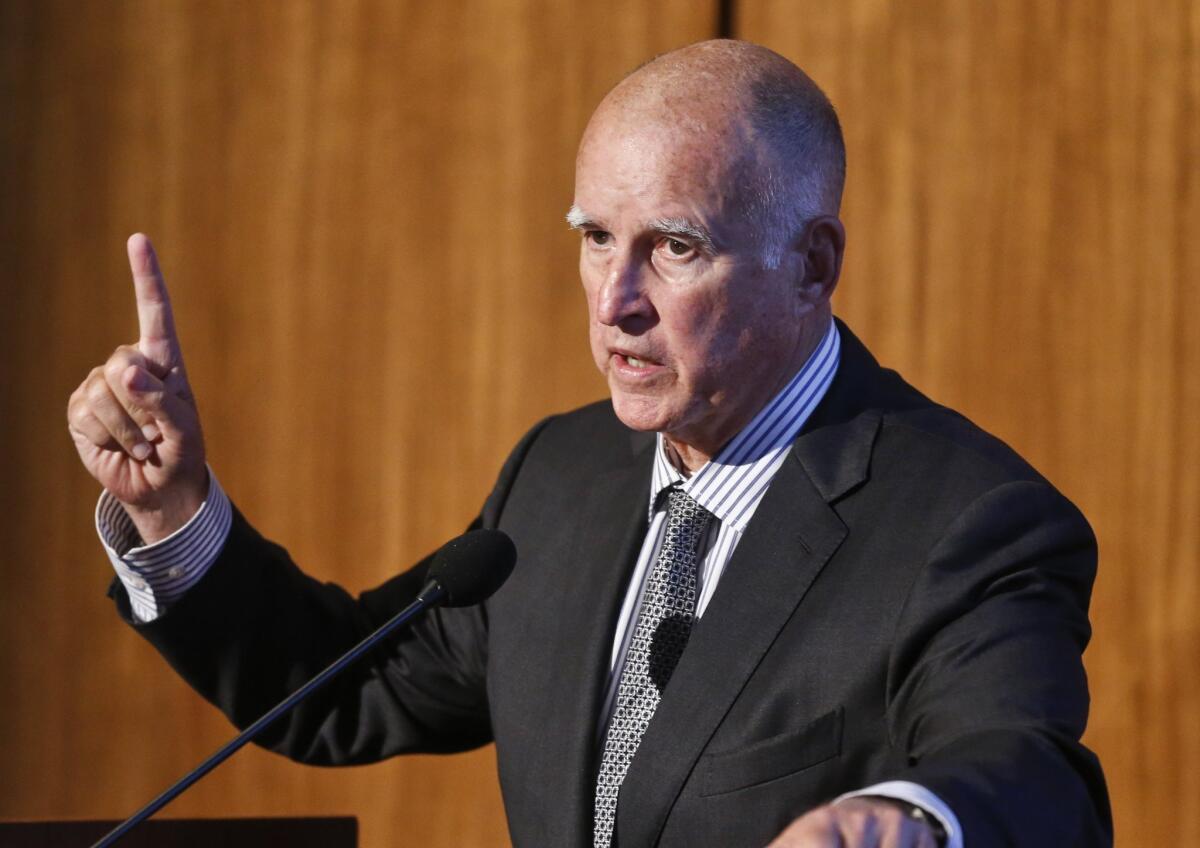Gov. Brown talks about threats at home and around the world as he arrives in Washington

- Share via
With political anger among his fellow Democrats at a fever pitch, Gov. Jerry Brown made it clear as he arrived in Washington on Monday that he feels no pressure to lead the charge in a battle pitting California against President Trump and the Republican agenda in Congress.
“I will pursue my own rhetorical paths,” Brown said after the second of two quick meetings scheduled just hours after he landed in the city.
Even so, the governor’s four-day visit comes in the midst of one of the capital city’s most contentious weeks this year. And its grand finale, Thursday’s expected vote in the House on the Republican effort to scrap the Affordable Care Act, holds particular importance for millions of Californians who could lose health coverage.
Brown attended a pair of events Monday in the early hours after his arrival, perhaps most notably meeting with Bob Fenton, the president’s director of the Federal Emergency Management Agency. On Saturday, the governor made a fourth request of Trump for a federal disaster declaration to cover the widespread damage from a series of winter storms.
The president approved the first three disaster efforts, with the most recent request including an estimate of more than $539 million in damage. The Brown administration said Monday that the single biggest expense is to repair the main and emergency spillways of Oroville Dam. That effort, alone, is projected to cost $274 million.
“I made my pitch,” Brown said of the meeting with Fenton. “We think it is very important. It involves lots of money and we think it would be very helpful if we get the presidential declaration we just submitted.”
Though much of the governor’s schedule over the next several days remains to be determined, his visit was scheduled to coincide with a meeting of directors for the Nuclear Threat Initiative. Brown joined the nonpartisan nonprofit organization’s board in January, and he hesitated to offer a direct opinion to reporters Monday night about the current threat of nuclear war under the new president.
“I would say it hasn’t been diminished,” he said. “I don’t want to speculate. It’s a little early.”
The governor’s first meeting Monday was with Wendy Sherman, an assistant secretary of State under President Obama who was the lead negotiator of the nuclear treaty with Iran in 2015. The meeting was also attended by former Secretary of State Madeleine Albright.
While others relish the chance to play on the nation’s largest political stage — a familiar longing for a man who ran unsuccessfully for president three times — Brown has rarely winged his way east since being elected in 2011. This week’s trip is just his seventh in six years.
At its outset, the trip largely reflects his current worldview, in which existential worries supersede more recurring and sharply partisan political fights. It coincides with an increasingly angry reaction from Democrats in the state Capitol about what they see in their federal counterparts, and as a number of significant efforts take shape in Sacramento to resist stepped-up efforts on immigration enforcement and rollbacks of efforts to combat climate change.
Brown, who turns 79 early next month, has largely steered clear of critiques of Trump. Only in a pair of January speeches, to scientists gathered in San Francisco and in his State of the State address, did the governor take aim at the rise of the president’s conservative political proposals. He’s otherwise taken a cautious approach.
Gov. Jerry Brown asks for $437 in flood protection and emergency relief »
“Gov. Brown has been likened to the ‘adult in the room’ in many of his political battles over the past few years, and it’s worked in his favor,” said Robin Swanson, a Democratic political strategist. “Given the president’s proclivity to overreact to the most superficial of perceived slights, it’s a smart place to start.”
One unanswered question is whether the governor can add any bipartisan appeal to this week’s trip. Brown has exchanged spirited letters in recent weeks with House Majority Leader Kevin McCarthy (R-Bakersfield) over the effect of repealing the Affordable Care Act. Some 4 million Californians have received coverage under its provisions, most of those through a federally funded expansion of the Medi-Cal program.
“If [Brown] meets with Democrats in Congress, then he’s meeting with the people who don’t have any real power,” said Rob Stutzman, a GOP political strategist.
A spokesman for Brown said the governor hopes to personally bring his concerns on healthcare and other issues to congressional leaders before returning home Thursday. And in comments to reporters Monday, Brown acknowledged the high stakes involved.
“I will do anything I can to lend my voice on that,” he said.
Follow @johnmyers on Twitter, sign up for our daily Essential Politics newsletter and listen to the weekly California Politics Podcast
Times staff writer Evan Halper contributed to this report.
ALSO
Gov. Jerry Brown in Washington: ‘Wherever we are going to find common ground, we are going to do it’
With $569 million in winter storm damage, Gov. Jerry Brown asks Trump for more federal disaster help
More to Read
Get the L.A. Times Politics newsletter
Deeply reported insights into legislation, politics and policy from Sacramento, Washington and beyond. In your inbox twice per week.
You may occasionally receive promotional content from the Los Angeles Times.











